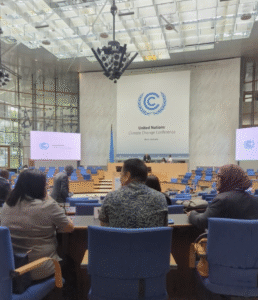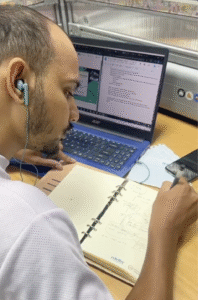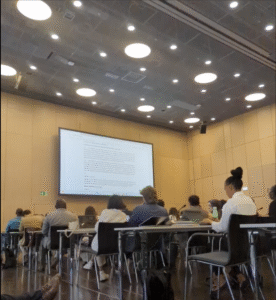Written by: Jinghann Hong
Edited by: Kieran Nair and Hanis Alwani
Formal negotiations aside, UNFCCC climate conferences are a great way to meet like-minded people passionate about combating climate change!
A home away from home
We were very fortunate to be accompanied by a moderately-sized Malaysian delegation (8 pax in total). Throughout the week, Ying Rui and I interacted with our kind counterparts from the Ministry of Natural Resources and Environmental Sustainability, Ministry of Finance, Attorney General Chambers, Ministry of Foreign Affairs, Forest Research Institute Malaysia and Malaysian Palm Oil Board.
These interactions helped us understand more of how the negotiations in SB62 were applicable (or not) to Malaysia. Encik Max and Puan Suhana were particularly generous with sharing their knowledge with us, as we were tracking similar topics i.e., finance and adaptation, respectively. Kami amat bersyukur atas sokongan mereka, terima kasih Encik Max dan Puan Suhana!
Even though we were not following the other negotiations, small exchanges with the other Malaysian delegates made us feel like a small part of home was with us in Bonn. For me, it was getting the chance to practice my (very rusty, but still functionable) Bahasa Malaysia 😉
Encik Hazwan, Head of Malaysia Delegation, providing closing remarks. (Source)
An international youth movement
Being a part of YOUNGO, the official children and youth constituency of the UNFCCC, helped a lot in preparing for SB62. In particular for me, the Adaptation Working Group hosted 6-8 capacity-building sessions leading up to the conference. Upon getting to Bonn, we found YOUNGO peers to be welcoming—it was a safe space to freely admit that this was your first SB, and ask all the silly questions one had to ask!
During the conference, there are tiered ways to support YOUNGO’s work. In the order of increasing involvement:
- Note-taking: There are shared notes across different WGs hosted on Google Drive. These are great to return to later, to understand a topic.
- Draft and/or make an intervention (an ‘intervention’ is a formal statement for Parties to express views): YOUNGO often makes official interventions to ensure the inclusion of children and youth in international climate policy, representing their perspectives and demands to decision-makers. Though co-facilitators of the session cannot take the statement into formal account, it is a good way to represent youth voices on the global stage.
- Plan and/or participate in an advocacy action (an ‘action’ is a peaceful, creative demonstration to raise awareness on an issue): Read here on the Secretariat’s decision to prohibit the use of the phrase “End the Siege” during an action.
- Organise and/or engage in a bilateral (a ‘bilateral’ involves securing time to speak with a negotiator, so as to share youths’ opinions on a certain issue): Ying Rui participated in a finance bilateral with the EU negotiators and found it an enriching experience.

An action calling for more accessible and transparent flows of public finance, where loan-based (private) finance was perceived as a Trojan Horse used to scale up profiteering and political leverage over the Global South. (Source)
Expanding the space of possibility
As MYD is also a member of the Climate Action Network (under the Southeast Asia branch, headed by our very own Nithi Nesadurai), we also had the opportunity to attend some of their open policy briefings. Here, we learnt more about how civil society organisations play their part in organising, supporting and responding to activities in formal spaces (a.k.a. negotiations).
Besides connecting all the different organisations who do important work under one umbrella, CAN also engages through knowledge exchange. For example, they distributed these factsheets debunking climate myths on carbon capture, utilisation and storage, and bioengineering.
I particularly enjoyed reading their ECO newsletter. The ECO newsletter is CAN’s daily take, published every morning during the UNFCCC negotiations. Behind the scenes, we got an opportunity to understand how it was produced in practice, with various people contributing pieces the night before it was sent for printing the next morning.
In conclusion, the SB62 experience is not just about negotiations, but about understanding why and how some Parties take the stance they take. In that, networking with different stakeholders broadened my perspective on how climate negotiations were approached from different angles, whether it was the local Malaysian take or a more internationally-organised one.




